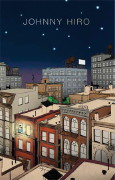Review: Johnny Hiro by Fred Chao

By Fred Chao
AdHouse Books, June 2009, $14.95
There’s a modern style of comics that I don’t think has a name yet – the school of [[[Scott Pilgrim]]], descended equally from Nintendo and the ‘90s autobiographical cartoonists. In those books, psychologically realistic protagonists live in crappy apartments in some city – typically, whichever one the cartoonist himself calls home – toil in jobs far from the corporate hurly-burly, though sometimes with chances for advancement, and find love with cute girls whose hair is held back by little clips. But they also fight evil ex-boyfriends, or the ninjas from a competing sushi restaurant, or something else equally unlikely. These are the autobio comics of a generation that doesn’t feel like separating reality from fantasy, that would rather tell stories about the way they wish their lives would be rather than the way they really are – the magic realism of the kids who grew up on Image comics and [[[Super Mario]]].
[[[Johnny Chao]]] is right in the middle of that genre; the title hero, a twentysomething half-Asian guy living in Brooklyn, works as a busboy for a sushi restaurant on Manhattan’s Lower East Side. But he’s a favorite of the owner/chef, Mr. Masago, entrusted with unexpected duties (one might even say missions) for the restaurant. And he’s living with the beautiful Mayumi, who does something in book publishing, probably in editorial. (And she’s doing pretty well there, since she seems to be about Johnny’s age and she already has her own office with a door. But she’s in this story primarily to be the “sexy girlfriend,” as she puts it in her not-quite-fluent English; she’s there to love and support Johnny, not to be an equal part of the story.)
So far, so ordinary. But the strangest things keep happening to Johnny, starting with the first story here (originally the first issue of a series in comic-book form; Johnny Hiro is episodic, but we’re all used to that in comics by now). You see, Johnny and Mayumi are sleeping peacefully in the early morning hours when a giant mutated lizard smashes in the wall of their apartment, grabs Mayumi, and continues its rampage through the city. All Johnny can do is shove some bunny slippers on his feet and rush off to save his girlfriend – which he does, more or less.
And the four other stories in this book – in which Johnny battles ninjas from a competing sushi restaurant over a lobster to serve a food critic, goes to the opera and runs into an old friend who’s being stalked by ronin-businessmen, embarks on an epic journey to the fish market to get aji despite the efforts of some of the workers there, is sued in Night Court (with Judge Judy presiding) over the destruction to his apartment by the giant lizard – have a similar surrealistic feel, like regular life pushed over the edge into something else.
Chao also includes a number of single-page gag strips in the back – often including famous people, mostly musicians, that Johnny just happens to be hanging out with. (Similar characters pop up around the edges of the longer stories as well, in flashbacks or commenting on the action.) Johnny is from the generation that has always known the media-saturated world – not only does he believe that he knows Coolio as well as he does his friends, or expect ninjas to attack him at work, but those things are actually true in his world. [[[Johnny Hiro]]] is post-postmodern, set in a world that has utterly assimilated the fictionalized version of itself and turned into a thoroughly mixed stew of reality and exaggeration.
Chao’s art is dynamic in a scratchy, loose-limbed indy-comics way, though his faces are all quite generic – and that’s a problem when there are this many supposedly-famous people wandering through the edges of the story. None of them really look like themselves, unless the reader squints hard and concentrates. It’s not a fatal flaw – these are still good-natured, big-hearted stories that at times strain to reach a higher emotional plane – but it’s something Chao should work on if he really wants to do comics with famous people in them.
Johnny Hiro is friendly and engaging, like that one friend who’s always eager to please but not quite sure if he should be the quiet serious one or the wacky life of the party. Chao does keep his tone consistent – except when he wanders briefly into high sentiment, now and then – but the matter of his story fluctuates wildly from slice-of-life to near-farcical broad action. The fact that he can keep all that in the same story and make it feel plausible and lived-in is a great sign; Johnny Hiro has some rough edges, but it’s a solid work by a fine creator.
Andrew Wheeler has been a publishing professional for nearly twenty years, with a long stint as a Senior Editor at the Science Fiction Book Club and a current position at John Wiley & Sons. He¹s been reading comics for longer than he cares to mention, and maintains a personal, mostly book-oriented blog at antickmusings.blogspot.com.
Publishers who would like to submit books for review should contact ComicMix through the usual channels or email Andrew Wheeler directly at acwheele (at) optonline (dot) net.











